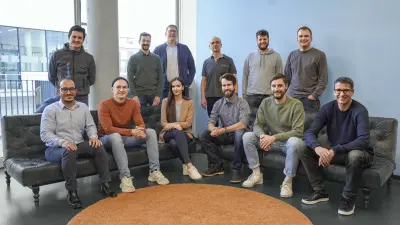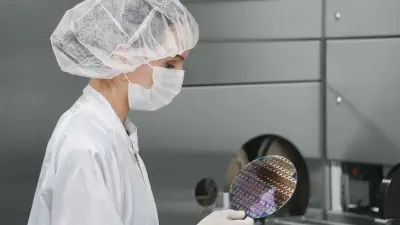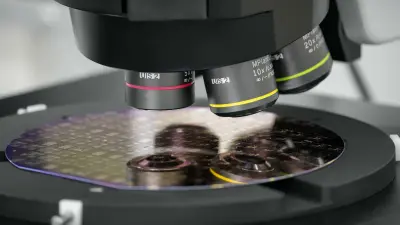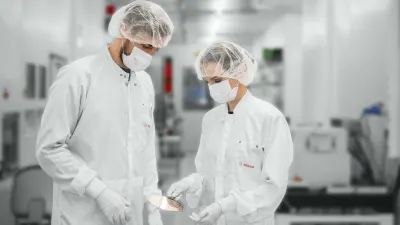Boosting electromobility — researchers’ potential as wide as the bandgap
Bosch Research Blog | Posted by Mirjam Henn, 2024-03-27

Research engineer Mirjam Henn discusses her work on wide bandgap semiconductors for e-mobility and shares her personal journey at Bosch Research, highlighting the environment and her experiences along the way.
Can you introduce yourself and tell us about your current role at Bosch Research?
My name is Mirjam Henn, and I am a research engineer at Bosch Research. I joined the company in April 2021 to pursue my PhD in electrical engineering in collaboration with the University of Bremen under the guidance of Prof. Nando Kaminski. Currently, I am part of the “Advanced Technologies and Micro Systems” department, where I work on researching wide bandgap power transistors to enhance the efficiency of electromobility.
Your primary research area focuses on semiconductors and power electronics. Could you provide a general explanation of how wide bandgap semiconductors function?
Wide bandgap semiconductors like silicon carbide (SiC) and gallium nitride (GaN) have a larger bandgap than silicon, resulting in a higher breakdown field strength. This allows wide bandgap transistors to be designed with higher breakdown voltage rating at a given on-state resistance compared to silicon transistors. Ultimately, this leads to better performance and less wasted energy in electric vehicles.
What attracted you to Bosch Research as an employer and what do you find particularly exciting or interesting about working here?
When I decided to join Bosch Research for my PhD, it was crucial for me to invest my time and energy in a place where my efforts would yield fruitful results. Bosch Research offered me the opportunity to make a significant contribution to our progress, and the chance to translate research into actual products, which I found incredibly exciting and motivating. Additionally, the fact that 100% of my PhD working hours were dedicated to research, without any distractions, won me over right away. Moreover, during the interview phase, I was impressed with the positive atmosphere within the team, and this impression remains with me to this day.

How did the transition from your PhD to your permanent position at Bosch Research unfold?
The transition from my PhD to my permanent position at Bosch Research was smooth and seamless. I had a clear vision of continuing my work with wide bandgap power semiconductors, specifically focusing on the transistor channel, which combines the subjects that I was passionate about during my Master's studies and PhD. Apart from my technical interests, I have an amazing team, and I thoroughly enjoy the spirit and working environment. In mid-2023, my managers approached me to discuss my future at Bosch Research. Shortly afterwards, I received an offer to continue working on the same as well as new topics in this creative environment, which I happily accepted.
How does the work environment and culture at Bosch Research support your research goals and aspirations?
The work environment at Bosch Research is characterized by a passion for research and innovation, with a strong focus on achieving tangible outcomes. What I find particularly valuable is our culture of appreciative discussion. Technical discussions within our team have a dynamic of their own, with everyone actively listening and contributing, regardless of their level of experience. This inclusive environment encourages the exchange of fresh ideas from recent graduates as well as insights from experienced Bosch professionals. Bosch Research also provides various platforms, such as innovation workshops, to pitch and support new ideas. This promotes and nurtures our own ideas by connecting us with suitable experts and providing the necessary resources.
Could you share some of the benefits or advantages you have experienced while working at Bosch Research?
Working at Bosch Research allows me to engage in research, be creative, and explore new avenues with the resources and dedication of a large industrial company. This combination of industry and research is truly the best of both worlds for me.

Knowing that the research I am conducting may have real-world applications and positively impact people's lives adds meaning to my work. During my PhD, I received tremendous support from my colleagues and managers in my department and project. Being part of a large team, engaging in technical discussions, and having access to all the necessary work equipment and resources greatly contributed to my overall job satisfaction. I am truly grateful for the support I have received from my very talented Bosch PhD supervisor, my amazing colleagues and team members, my professor, my mentor, PhD friends, and managers!
In what ways does working at Bosch Research provide you with opportunities for professional and personal growth and development, and are there any specific programs or initiatives that have supported your career advancement?
At Bosch Research, sharing research findings with others is highly encouraged, and publications are a natural part of our work. I have had several opportunities to present my research internally and externally, which has contributed to my professional growth. I also had the privilege of representing Bosch externally at an international level, such as giving a talk at a symposium organized by Nobel Prize laureate Prof. Amano at Nagoya University in Japan. This experience was invaluable and helped me grow both personally and professionally. Bosch Research also offers a PhD program that allows the 300 Bosch PhD students to network and organize themselves, with strong support from HR and Bosch Research management. The program includes mentoring, which provides opportunities to interact with and learn from senior associates. And even during the PhD program, you get useful insight into project management, company processes, and networking opportunities. Personal development does not end with the PhD program, as Bosch Research offers various training courses and conferences.
Could you tell us more about the work you and your team do at Bosch Research?
We focus on developing wide bandgap power transistors for electromobility. In electric vehicles, the battery provides a DC voltage that needs to be converted into alternating current for the drivetrain. This conversion is done using traction inverters, with power transistors as their core component. Transistors act as electrical switches, allowing current to pass with minimal losses in the on-state and blocking high battery voltage in the off-state. With the increasing electrification of vehicles, there is a need for higher energy efficiency and performance. Silicon, the most well-known semiconductor, is reaching its limits, which is where wide bandgap semiconductors come into play.

I primarily work on the transistor channel and the gate complex, focusing on the behavior of the transistor in its on-state. Key criteria include high channel mobility to reduce resistance, as well as robustness and reliability, which are crucial for safety in the automotive industry.
The transistor channel is strongly influenced by the interface between the gate dielectric and the semiconductor. Imperfections at this interface cause scattering of electrons traveling through the channel, reducing channel mobility. My research involves improving the quality of this interface through various processes, including pre-treatments of the semiconductor, different gate dielectric materials and according deposition methods, as well as post-treatments.
Could you explain your approach and the methodology in your work?
Our research involves working on the devices from start to finish, which requires an interdisciplinary approach. In my case, I create the layout and design, set up the process flow, manufacture the devices in our R&D clean room, and carry out electrical characterization and validation. Structural and chemical analyses are outsourced when necessary. Working in all areas is challenging but provides the advantage of a holistic understanding. Of course, Experts in each specific area support us in this.
What challenges do you face in your current research?
Wide bandgap semiconductors offer significant material advantages, but adapting and inventing new manufacturing processes to fully exploit these advantages is challenging. Far less research has been done on wide bandgap semiconductors compared to silicon, which means there is less existing knowledge to rely on. Additionally, manufacturing a complex device like a transistor requires outstanding teamwork and careful coordination of all sub-areas to ensure functionality.

How can the outcomes of your research contribute to the development of solutions that are “Invented for life”?
Climate change is one major challenge that electrification can help address. The efficiency of energy conversion is a crucial parameter in this regard, and it depends on power transistors. As an industrial company, we strive to balance performance and reliability of these devices. While it may be tempting to focus on individual record values, our goal is to address and solve each problem to achieve an overall performant device with a long lifetime. Our contribution lies in the determination and perseverance to make wide bandgap transistors available to the public, such as our SiC power transistors.
Can you share any examples of how your team's research at Bosch Research has made a tangible impact or contributed to the company's innovation efforts?
One of my team’s most prominent examples is our research on SiC transistors. We have enabled and supported the industrialization of SiC at Bosch working closely with our business unit in Reutlingen, and we are now filling the SiC innovation pipeline with novel concepts. The first generations of these devices are already being used in the traction inverters of electric cars. In fact, Bosch plans to invest some $1.5 billion in the transformation of a wafer fab in Roseville, USA, further emphasizing our commitment to SiC. Another example is the successful coordination of the YESvGaN project, where Bosch, as the consortium leader, has achieved great results alongside 22 other European partners. This project aims to develop vertical GaN power transistors that could potentially outperform SiC transistors in the future. These transistors also have the potential to reduce costs significantly, which would make wide bandgap transistors more widely available.
Looking ahead, what are your future aspirations and goals within Bosch Research?
In terms of technical topics, I would like to gather more expertise in the field of wide bandgap power transistors, as the subject is vast and constantly evolving. Personally, I have a dream that my research, such as a transistor channel process, will have a practical impact and be implemented in real-world applications. As a team, the goal is to maintain a full innovation pipeline and establish Bosch as a well-known manufacturer of wide bandgap power transistors for electromobility. This also means exploring potential next-generation power electronic materials like gallium nitride, gallium oxide, and aluminum nitride at an early stage.
What are your thoughts on this topic?
Please feel free to share them or to contact us directly.

Author: Mirjam Henn
Mirjam Henn studied physics at the Karlsruhe Institute of Technology (KIT), where she specialized in the physics of semiconductors, physics of surfaces, nanotechnology, and electronic properties of solids. In April 2021, Mirjam started her doctorate in electrical engineering at Bosch Research in cooperation with the University of Bremen. The main focus of her PhD is the characterization and improvement of the channel properties of gallium nitride power transistors. In January 2024, she accepted a position as a research engineer at Bosch Research to continue and expand her work on wide bandgap power transistors for electromobility.

